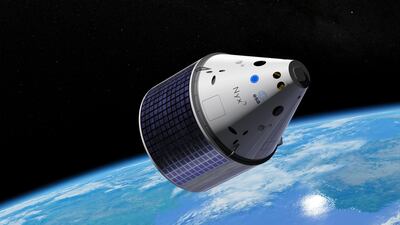A French-German startup is attempting to develop the first European reusable space capsule that can deliver cargo to space stations.
The Exploration Company, founded in 2021, is trying to compete with established players like America's SpaceX and Northrop Grumman by offering a competitive price of $150 million per mission, with a payload capacity of 4,000kg of cargo from Earth to the space station.
SpaceX typically charges about $152 million per mission to send cargo and supplies.
“We are trying to develop spacecraft that will be more accessible, sustainable and lower cost upfront,” Mark Kirasich, vice president of the company’s US operations, told The National on Tuesday.
The company hopes to do a demonstration mission by next year, in which the Nyx vehicle would launch and dock with the International Space Station and return to Earth.
If successful, the company could compete for more than just the Cargo Resupply Services contract that Nasa awards, as other companies working on commercial space stations, such as the Axiom Space Station, will have similar needs.
“What we want to do is fly multiple Nyx cargo missions, first to the International Space station, before its current planned retirement in 2030s,” said Mr Kirasich.
“Then begin flights to the new commercial low-Earth orbit destination of the space station.”
Mr Kirasich was recently appointed to spearhead the operations of the company’s US branch, which will work towards ensuring Nyx is Nasa-certified and finds opportunities in Nasa’s lunar mission programme called Artemis.
His wealth of experience is drawn from time spent being Nasa’s deputy associate administrator for Artemis Campaign Development, Orion spacecraft programme manager (the capsule that will take astronauts to the Moon) and senior director of human space flight at Jeff Bezos’s company Blue Origin.
“If you're going to develop what is generically called a visiting vehicle, either a cargo vehicle or a vehicle that brings people to space stations, you have to have a certification,” he said.
“This means somebody has looked at how you've developed the spacecraft, how you've tested the spacecraft, done test or demonstration flights and you receive a certification.
“And right now Nasa has the primary agency role that certifies spacecraft that visit space station, so we must be close to Nasa and throughout the certification process.”
'DHL of space'
The Nyx spacecraft's modular design allows for customisation to meet specific mission requirements, including accommodating various payload capacities and types of cargo.
The company's vision is to become the “DHL of space,” offering cost-effective and reusable spacecraft to provide easy and frequent delivery services to space.
By establishing regular flights, The Exploration Company aims to “democratise” space, enabling more organisations, both within and outside the space sector, to access space, unlike the current scenario where only a few companies dominate the market.
“Initially, our goal is to fly once a year, but we'd really like to ramp that up,” said Mr Kirasich.
“When you look at the traffic models for servicing the International Space Station and potential commercial low-Earth orbit destinations, it suggests a need for two or three cargo vehicles per year.
“We'll be competing with other providers, but we'd love to secure as much of that business as possible.”
With the ISS nearing retirement, several companies have announced plans to develop a commercial space station, such as Blue Origin, Lockheed Martin and Axiom Space.
Delivery services to the Moon
With renewed interest in the Moon by space agencies, the company is also planning to send vehicles to the Lunar Gateway – a planned station in lunar orbit that Nasa and its international partners are developing.
It says on its website that the vehicle can carry a 5,000kg payload capacity to the station at a price of $400 million.
“That's one of the key capabilities, if you will, is to get cargo back from the Moon because we're sending people there to do exploration and to bring back samples,” said Mr Kirasich.
“Our additional goal is also to eventually evolve the next (vehicle) into a crewed spacecraft so we can fly people up and down from the surface of the Earth to space.”
Providing services on the Moon is also an emerging market that companies are hoping to win contracts for.
In 2021, SpaceX won a $2.89 billion contract with Nasa to develop a Starship lander that would help their astronauts touchdown on the Moon.
Blue Origin won a $3.4 billion contract two years later to land Nasa astronauts on the lunar surface.











